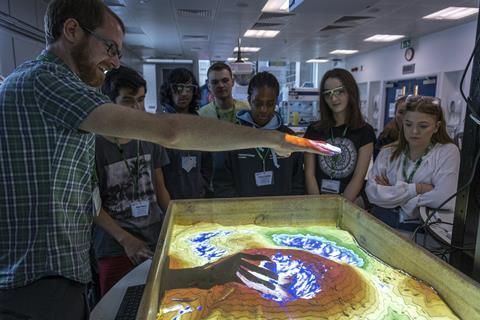HE and secondary staff need to work together to improve opportunities that encourage students to continue to study science
Despite being a popular A-level subject, there has been a steady decline in the number of students opting to study chemistry at university, with applications down by 21% over the last three years. So, should we be doing more to improve partnerships and opportunities between schools and universities to promote the study of chemistry in higher education (HE)?
State schools find it harder to access partnerships with higher education institutions (HEIs) and schools that serve deprived communities are more than two-and-a-half times more likely to encounter barriers in getting university access help for their pupils relative to the private sector. This news will certainly concern HE widening participation and outreach departments. However, there are opportunities for schools to access HE through university open days, summer schools, taster days, masterclasses, CPD opportunities for teachers and technicians, and public lectures. However, are HEI’s providing the right opportunities to maximise the impact they have on prospective students and teachers?

From an HEI perspective, these events are an opportunity to form and maintain relationships with students, teachers, departments and schools. The aim is to inspire students to continue their studies, to consider a degree/apprenticeship and potentially to choose to study chemistry at the HEI. From a school perspective, university taster days and masterclasses provide students with first-hand experience of HE. These close relationships offer opportunities to visit the campus, meet with current students and gain an insight into life at university. If events are designed with schools in mind, they can be linked to the curriculum and help demystify HE. In addition to informing and inspiring students, these sessions can also provide information on the admissions process and career opportunities and pathways so teachers are more informed when advising their students on selecting both a subject and a HEI.
Accessibility
Whether state schools find it more difficult to access HEI resources than independent schools is up for debate. For example, some HEI’s only run events for students from the state sector, which makes it harder for private schools to access partnerships with that HEI. In London, both Kings College and Imperial College run chemistry summer schools only for applicants from the state sector and actively promote students from a widening participation background. Partnerships are dependent upon the actual classroom teacher and the vision of the head of department. Queen Mary University of London (QMUL) has some excellent partnerships with schools in the local area from both the state and private sector and students from these schools regularly attend events run by the chemistry department. These schools feel they have good access to HE due to the success of their relationship. Trevor Grant, head of chemistry at Graveney School, says ‘Overall access to HEIs is good but it can take a bit of time to find out who we need to talk to… but then good relationships are formed, which means we can organize some events.’
It does help if we have a personal connection to the HEI
From a HEI perspective, there are a number of reasons why state schools may find it more difficult to access partnerships with universities. Susan Matthews, senior lecturer at the University of East Anglia, believes administrative problems are to blame. When HEIs send out information it can be difficult to ensure that information reaches the right person in a state school. Likewise, if a school wants to arrange a visit it can be just as difficult to contact the right person. ‘It does help if we have a personal connection to the HEI,’ says Christabel Haines, head of chemistry at Greenford School. Furthermore, teachers in state schools are less likely to have the time or resources to seek out contacts and foster the relationships needed to ensure access to HE. So you could argue that HEIs should reach out to schools, but, unless a department has a dedicated member of staff, time constraints make this approach unfeasible.
Timing of events can also create barriers. HEIs would prefer to run events outside of their semester times, which is not always ideal for schools. Teachers are under pressure to ensure the curriculum is taught before the all-important exam period and they may feel they cannot justify a visit to a HEI or there is no time left in the term. This barrier is difficult to overcome because it requires both schools and universities to work together to plan events, ensure that the content and delivery enriches the national curriculum, and that students, teachers and academics alike benefit from participating.
Another obstacle facing state schools is that HEIs often offer selective opportunities through enrichment/gifted-and-talented schemes, or schools are asked to select students based on enthusiasm and talent for a chosen subject. Such schemes may mean that a disinterested young adult misses out on the opportunity to be inspired to aim higher because they don’t meet academic criteria. Similarly, fee-paying events disfavour students from poor backgrounds. HEI’s often have funding to cover costs for students from disadvantaged backgrounds, but in these instances students may put off from applying in the first place. Susan suggests that HEI’s need to look at how they engage and work with schools to ensure fair and open access to all.
Resources
So, is it simply a matter of time and resources? If so, then the funding from the Department of Education announced this summer will help because it can be used to provide cover for teachers or buy out a teacher for a few hours a week to work on building key partnerships in HE. Tippu Sherriff, senior lecturer at QMUL, believes schemes such as Spectroscopy in a Suitcase and the Schools Analyst competition, both run by the Royal Society of Chemistry, help to forge relationships and make that initial contact between school and university. Once established, these relationships can be very fruitful, but they need to be maintained and staff turnover at schools can risk that relationship’s success. Finally, HEIs need to look at what they are offering schools in terms of a partnership and whether it works for both sides. Improvements don’t need to be dramatic but rather customised to the needs and goals of each department and school. Funding could be used for schools and HEIs to work together to develop bespoke opportunities. The most important aspect is to build and maintain these relationships for the betterment of our students and for the future of chemistry.













No comments yet